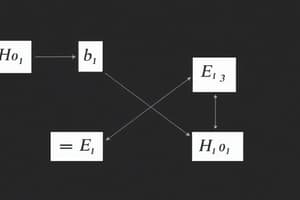Podcast
Questions and Answers
Which logical connective represents 'and' in propositional logic?
Which logical connective represents 'and' in propositional logic?
- ∨
- ¬
- →
- ∧ (correct)
What is the logical connective for 'or' in propositional logic?
What is the logical connective for 'or' in propositional logic?
- ¬
- ∧
- ∨ (correct)
- →
Which symbol represents 'not' in propositional logic?
Which symbol represents 'not' in propositional logic?
- ∧
- ∨
- →
- ¬ (correct)
What is the logical connective for 'if...then' in propositional logic?
What is the logical connective for 'if...then' in propositional logic?
What is logic?
What is logic?
What is propositional logic also known as?
What is propositional logic also known as?
In symbolic logic, what do propositions represent?
In symbolic logic, what do propositions represent?
How are propositions often thought of?
How are propositions often thought of?
How are propositions combined in propositional logic?
How are propositions combined in propositional logic?
What type of statements does propositional logic deal with?
What type of statements does propositional logic deal with?
Who is considered a cornerstone of the field of logic and lived in the 4th century BCE?
Who is considered a cornerstone of the field of logic and lived in the 4th century BCE?
Which logicians made significant contributions to the field of logic in the Middle Ages?
Which logicians made significant contributions to the field of logic in the Middle Ages?
Which philosophers continued to refine and expand upon the principles of logic during the Renaissance?
Which philosophers continued to refine and expand upon the principles of logic during the Renaissance?
Who introduced the concept of symbolic logic in the modern era?
Who introduced the concept of symbolic logic in the modern era?
What is the branch of philosophy that deals with the principles of correct reasoning?
What is the branch of philosophy that deals with the principles of correct reasoning?
What are some concepts studied in logic, including validity, soundness, and logical fallacies?
What are some concepts studied in logic, including validity, soundness, and logical fallacies?
What is the focus of formal logic?
What is the focus of formal logic?
What does informal logic focus on?
What does informal logic focus on?
What does mathematical logic combine?
What does mathematical logic combine?
How does symbolic logic represent and analyze logical arguments?
How does symbolic logic represent and analyze logical arguments?
Who is considered one of the founders of formal logic?
Who is considered one of the founders of formal logic?
Who developed the theory of propositions in medieval logic?
Who developed the theory of propositions in medieval logic?
What is William of Ockham best known for?
What is William of Ockham best known for?
Who introduced the concept of symbolic logic?
Who introduced the concept of symbolic logic?
Who made significant contributions to the development of mathematical logic and the philosophy of language?
Who made significant contributions to the development of mathematical logic and the philosophy of language?
What is logic?
What is logic?
Study Notes
Logic: The Study of Reason and Valid Inference
Logic, as a branch of philosophy and mathematics, is the study of reason and valid inference. It focuses on the principles of correct reasoning and the study of principles of argumentation and inference. Logic is concerned with the fundamental questions of what is true and what is justified in our belief, and it helps us to understand the relationship between propositions and to develop arguments that are valid and sound.
Propositional Logic
Propositional logic, also known as sentential logic, is a subfield of logic that deals with propositions or statements. Propositions are often thought of as structured sentences that express facts, opinions, or beliefs about the world.
A proposition is a set of symbols that represents a statement. Symbolic logic studies the properties of these symbols. Propositional logic deals with the manipulation and combination of propositions, which can be true or false. Propositions can be combined using logical connectives, such as 'and,' 'or,' 'not,' and 'if-then,' to form complex propositions.
For example, the proposition "It is raining" can be represented as p. Using logical connectives, we can create more complex propositions, such as "It is raining and the sun is shining" (p ∧ q), "It is raining or the sun is shining" (p ∨ q), "It is not raining" (¬p), "If it is raining, then the sun is shining" (p → q).
The study of propositional logic involves the construction and analysis of arguments, which are collections of propositions that lead from premises to conclusions. Propositional logic provides a way to determine whether the connections between propositions in an argument are valid.
In conclusion, propositional logic is a fundamental aspect of logic, as it deals with the manipulation and combination of propositions to form complex statements. By studying propositional logic, we can better understand the structure of arguments and the principles of correct reasoning.
Studying That Suits You
Use AI to generate personalized quizzes and flashcards to suit your learning preferences.
Description
This quiz covers the fundamentals of propositional logic, which is a subfield of logic dealing with propositions or statements. It involves the manipulation and combination of propositions using logical connectives like 'and,' 'or,' 'not,' and 'if-then' to form complex statements. The quiz also explores the construction and analysis of arguments based on propositional logic, helping learners understand the principles of correct reasoning.




